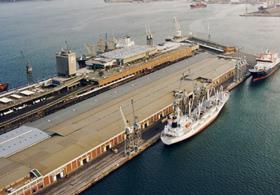
One week after the first-ever break bulk reefer vessel with South African citrus to China sailed from Durban, the second vessel arrived in port.
In all, eight reefer vessels are now already planned for the season, co-loading for both Japan and China. “The loading of the first vessel, Baltic Summer, went smoothly,” says Mitchell Brooke, the Citrus Growers’ Association (CGA) logistics development manager. “The breakbulk shipment in a way already proved its worth, because at the same time there was a strike involving containers in the port of Durban. The Baltic Summer was not affected by the strike and loaded without problems.”
It seems that the first shipment has already firmly established the concept of breakbulk reefer co-loading to Japan and China. This is illustrated by the fact that the second vessel is already loading and should sail by the weekend.
All vessels in the programme will discharge first in Japan and then in China so that the sterri-programmes can be completed during transit time. Eventually it is expected that South Korea will also be included in the breakbulk programme.
On the subject of shipments to the east, South Africa has received further good news which will affect marketing this season. Indonesia has lifted the moratorium on permits that was instituted in February 2019, meaning that Indonesian importers meeting the requirements can now apply for permits across all lines for importing citrus this season.
The CGA’s Justin Chadwick says the South African Department of Agriculture, Forestry and Fisheries (DAFF), PPECB and South African Citrus Research Institute (CRI) have revised shipping temperature rules to fall in line with Indonesian requirements, which involves the lifting of the set point of measurements.
“This will allow shipping at slightly higher temperatures,” says Chadwick. “The shipment temperatures will be monitored in 2019 in order to review the requirements in the future. Exporters sending fruit to Indonesia should contact PPECB to discuss the latest developments.”
Chadwick says there is no doubt that Indonesia presents an exciting market for Southern African citrus.
“If Jakarta is anything to go by, the country is on the move with regards to development; with new, modern designed buildings dominating the sky line. Our recent delegation also found that there was a noticeable improvement in traffic congestion in Jakarta which is due to the construction of new roads and infrastructure in the city. South Africa also has an active Embassy in Jakarta, with ambassador Fisher and his staff fully briefed on the opportunities and challenges for South African fruit.”
Meanwhile, the country's citrus forecast has been adjust slightly downwards, with grapefruit, soft citrus and lemons all dropping somewhat.
The new total estimate is 135.1m cartons, which is about 2m cartons fewer than the first forecast. The latest forecast is about 1m cartons down on last year’s record crop.



